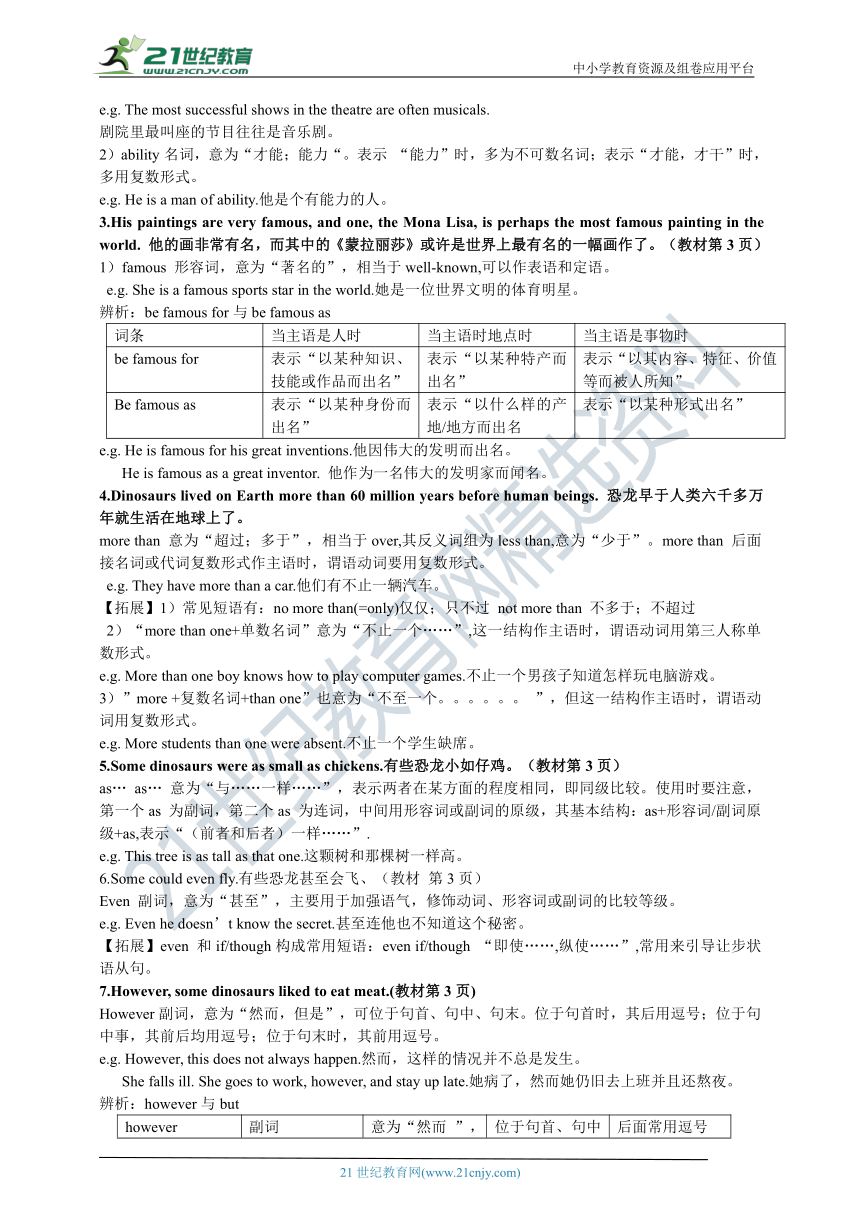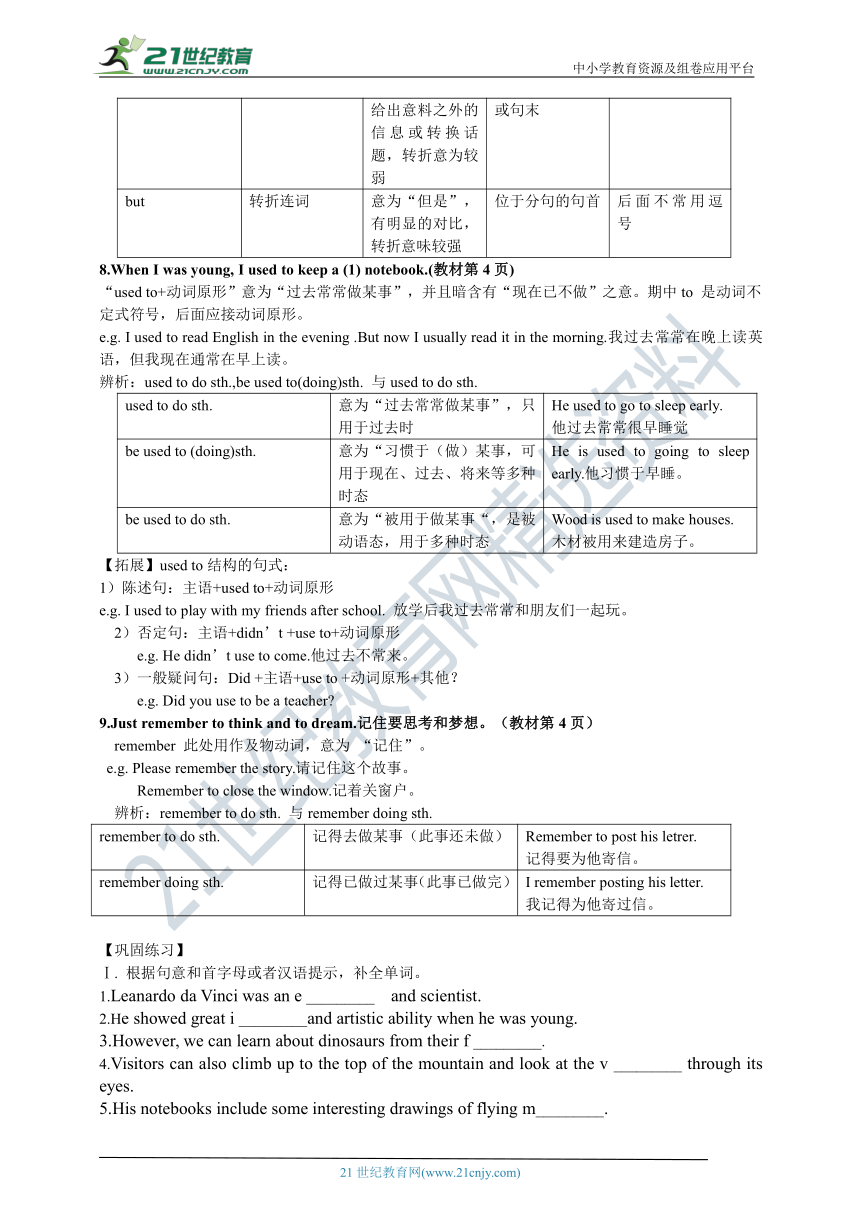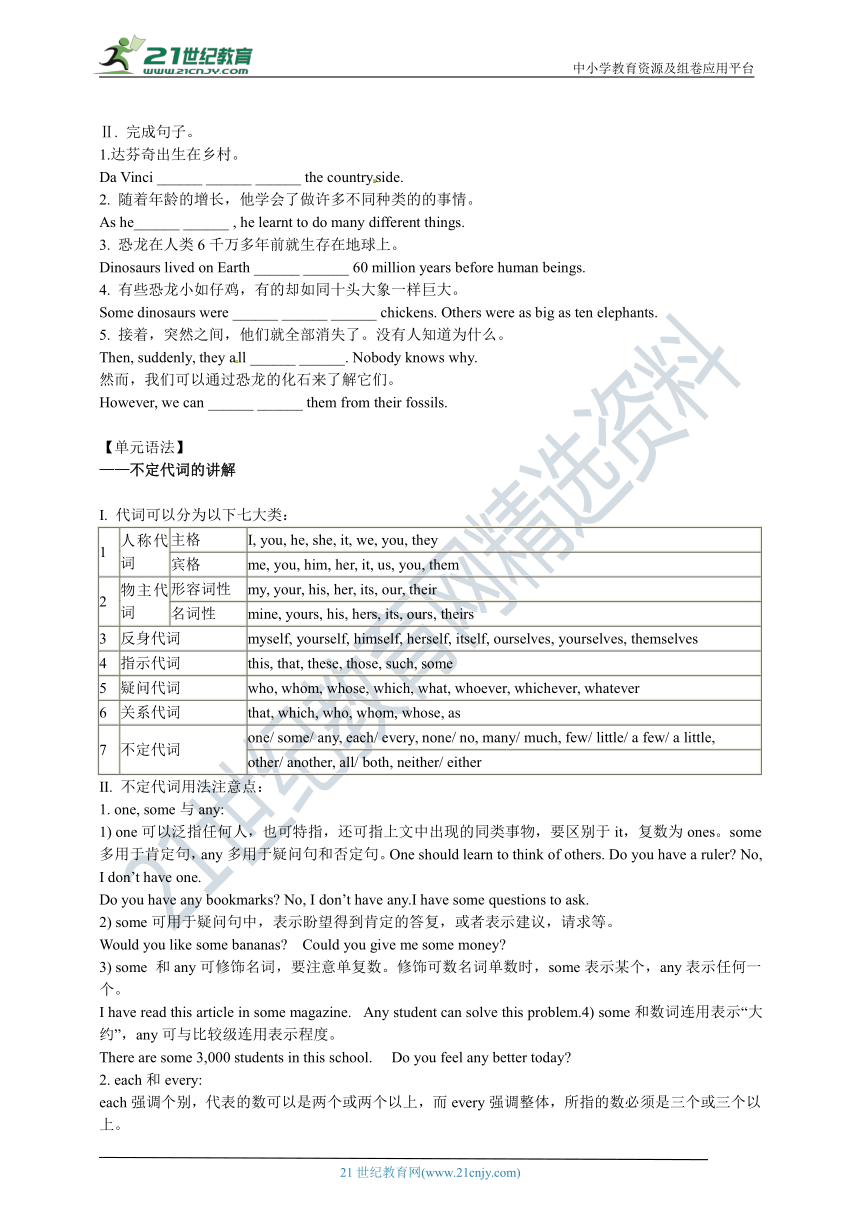Module 1 Amazing things Unit 1 Encyclopaedias 同步学案(含答案)
文档属性
| 名称 | Module 1 Amazing things Unit 1 Encyclopaedias 同步学案(含答案) |

|
|
| 格式 | zip | ||
| 文件大小 | 1.2MB | ||
| 资源类型 | 试卷 | ||
| 版本资源 | 牛津深圳版 | ||
| 科目 | 英语 | ||
| 更新时间 | 2020-07-23 00:00:00 | ||
图片预览




文档简介
中小学教育资源及组卷应用平台
Unit
1
Encyclopaedias学案
【必考词汇】
1.
inventor
n.
发明家
v.
___________
n.
(发明)
____________
1)
Edison
is
one
of
the
greatest
____________.
2)
He
_________many
things.
His
most
important
___________
was
the
electric
light.
【拓展】
v.+
________→
n.
吗?
如teach
–teacher;
read--_______
write--________
paint--________
engine--________
(注意:inventor,
visitor
是or结尾哦)
music
_________(音乐家)
science
_________
(科学家)
If
I
am
a
________,
I
can
find
out
how
the
________
fiction
of
the
flying
car
we
all
know
and
love.
2.
be
born
v.
出生
be
born
in…出生于某地
be
born
on
/in
….出生于某日/月/年
1)
我出生于2010年1月7日。
I_________
________
_______
January
7,
2010
2)
他出生在深圳吗?
______
he
_________
__________Shenzhen?
3.
include
vt.
,
“包括,包含”,介词:__________
1).
家务不只包括洗衣服。
Housework
doesn’t
only
____________
doing
some
washing.
2).
四位学生正在打乒乓球,包括两位女孩。
Four
students
are
playing
table
tennis,
_________________.
【必考句型】
1.Look
it
up!(教材第3页)
Look
up
意为“查阅;查询”强调在词典、参考书等工具、计算机等中查询。Look
up是“动词+副词”结构的短语,其后的宾语是名词时,名词可放在副词前或后;宾语是人称代词时,只能放在动词和副词之间。
e.g.
We
can
look
up
new
words
in
a
dictionary.
我们可以在词典中查新单词。
They
are
looking
them
up
on
the
Internet.
【拓展】
1)look
up
仰视;向上看
e.g.
looked
up
from
his
book
as
I
came
into
the
room.
2)look的相关短语
look
around
向周围看
look
out
向外看;当心
look
like
看起来像
look
the
same
看起来相同
look
forward
to
盼望
look
for
寻找
look
after
照看,照顾
look
at
看
look
over
仔细检查
From
an
early
age,
he
showed
great
intelligence
and
artistic
ability.
很小的时候,他就展现出超凡的智慧和艺术才能。(教材第3页)
1)show
此处用作及物动词,意为“展示;出示;把……给某人看”.
其后可接双宾语,即show+间接宾语(sb.)+直接宾语(sth.).常见短语:show
sb.
sth.=show
sth.
To
sb.把某物给某人看;show
sb.
around
some
place
带领某人参观某地。
e.g.
He
showed
me
his
photo.=He
showed
his
photo
to
me.他给我看了他的照片。
【拓展】show还可作名词,意为“表演,节目;展览“。
e.g.
The
most
successful
shows
in
the
theatre
are
often
musicals.
剧院里最叫座的节目往往是音乐剧。
2)ability名词,意为“才能;能力“。表示
“能力”时,多为不可数名词;表示“才能,才干”时,多用复数形式。
e.g.
He
is
a
man
of
ability.他是个有能力的人。
3.His
paintings
are
very
famous,
and
one,
the
Mona
Lisa,
is
perhaps
the
most
famous
painting
in
the
world.
他的画非常有名,而其中的《蒙拉丽莎》或许是世界上最有名的一幅画作了。(教材第3页)
1)famous
形容词,意为“著名的”,相当于well-known,可以作表语和定语。
e.g.
She
is
a
famous
sports
star
in
the
world.她是一位世界文明的体育明星。
辨析:be
famous
for与be
famous
as
词条
当主语是人时
当主语时地点时
当主语是事物时
be
famous
for
表示“以某种知识、技能或作品而出名”
表示“以某种特产而出名”
表示“以其内容、特征、价值等而被人所知”
Be
famous
as
表示“以某种身份而出名”
表示“以什么样的产地/地方而出名
表示“以某种形式出名”
e.g.
He
is
famous
for
his
great
inventions.他因伟大的发明而出名。
He
is
famous
as
a
great
inventor.
他作为一名伟大的发明家而闻名。
4.Dinosaurs
lived
on
Earth
more
than
60
million
years
before
human
beings.
恐龙早于人类六千多万年就生活在地球上了。
more
than
意为“超过;多于”,相当于over,其反义词组为less
than,意为“少于”。more
than
后面接名词或代词复数形式作主语时,谓语动词要用复数形式。
e.g.
They
have
more
than
a
car.他们有不止一辆汽车。
【拓展】1)常见短语有:no
more
than(=only)仅仅;只不过
not
more
than
不多于;不超过
2)“more
than
one+单数名词”意为“不止一个……”,这一结构作主语时,谓语动词用第三人称单数形式。
e.g.
More
than
one
boy
knows
how
to
play
computer
games.不止一个男孩子知道怎样玩电脑游戏。
3)”more
+复数名词+than
one”也意为“不至一个。。。。。。
”,但这一结构作主语时,谓语动词用复数形式。
e.g.
More
students
than
one
were
absent.不止一个学生缺席。
5.Some
dinosaurs
were
as
small
as
chickens.有些恐龙小如仔鸡。(教材第3页)
as…
as…
意为“与……一样……”,表示两者在某方面的程度相同,即同级比较。使用时要注意,第一个as
为副词,第二个as
为连词,中间用形容词或副词的原级,其基本结构:as+形容词/副词原级+as,表示“(前者和后者)一样……”.
e.g.
This
tree
is
as
tall
as
that
one.这颗树和那棵树一样高。
6.Some
could
even
fly.有些恐龙甚至会飞、(教材
第3页)
Even
副词,意为“甚至”,主要用于加强语气,修饰动词、形容词或副词的比较等级。
e.g.
Even
he
doesn’t
know
the
secret.甚至连他也不知道这个秘密。
【拓展】even
和if/though构成常用短语:even
if/though
“即使……,纵使……”,常用来引导让步状语从句。
7.However,
some
dinosaurs
liked
to
eat
meat.(教材第3页)
However副词,意为“然而,但是”,可位于句首、句中、句末。位于句首时,其后用逗号;位于句中事,其前后均用逗号;位于句末时,其前用逗号。
e.g.
However,
this
does
not
always
happen.然而,这样的情况并不总是发生。
She
falls
ill.
She
goes
to
work,
however,
and
stay
up
late.她病了,然而她仍旧去上班并且还熬夜。
辨析:however与but
however
副词
意为“然而
”,给出意料之外的信息或转换话题,转折意为较弱
位于句首、句中或句末
后面常用逗号
but
转折连词
意为“但是”,有明显的对比,转折意味较强
位于分句的句首
后面不常用逗号
8.When
I
was
young,
I
used
to
keep
a
(1)
notebook.(教材第4页)
“used
to+动词原形”意为“过去常常做某事”,并且暗含有“现在已不做”之意。期中to
是动词不定式符号,后面应接动词原形。
e.g.
I
used
to
read
English
in
the
evening
.But
now
I
usually
read
it
in
the
morning.我过去常常在晚上读英语,但我现在通常在早上读。
辨析:used
to
do
sth.,be
used
to(doing)sth.
与used
to
do
sth.
used
to
do
sth.
意为“过去常常做某事”,只用于过去时
He
used
to
go
to
sleep
early.他过去常常很早睡觉
be
used
to
(doing)sth.
意为“习惯于(做)某事,可用于现在、过去、将来等多种时态
He
is
used
to
going
to
sleep
early.他习惯于早睡。
be
used
to
do
sth.
意为“被用于做某事“,是被动语态,用于多种时态
Wood
is
used
to
make
houses.木材被用来建造房子。
【拓展】used
to结构的句式:
1)陈述句:主语+used
to+动词原形
e.g.
I
used
to
play
with
my
friends
after
school.
放学后我过去常常和朋友们一起玩。
2)否定句:主语+didn’t
+use
to+动词原形
e.g.
He
didn’t
use
to
come.他过去不常来。
3)一般疑问句:Did
+主语+use
to
+动词原形+其他?
e.g.
Did
you
use
to
be
a
teacher?
9.Just
remember
to
think
and
to
dream.记住要思考和梦想。(教材第4页)
remember
此处用作及物动词,意为
“记住”。
e.g.
Please
remember
the
story.请记住这个故事。
Remember
to
close
the
window.记着关窗户。
辨析:remember
to
do
sth.
与remember
doing
sth.
remember
to
do
sth.
记得去做某事(此事还未做)
Remember
to
post
his
letrer.记得要为他寄信。
remember
doing
sth.
记得已做过某事(此事已做完)
I
remember
posting
his
letter.我记得为他寄过信。
【巩固练习】
Ⅰ.
根据句意和首字母或者汉语提示,补全单词。
1.Leanardo
da
Vinci
was
an
e
_________
and
scientist.
2.He
showed
great
i
_________and
artistic
ability
when
he
was
young.
3.However,
we
can
learn
about
dinosaurs
from
their
f
_________.
4.Visitors
can
also
climb
up
to
the
top
of
the
mountain
and
look
at
the
v
_________
through
its
eyes.
5.His
notebooks
include
some
interesting
drawings
of
flying
m_________.
Ⅱ.
完成句子。
1.达芬奇出生在乡村。
Da
Vinci
______
______
______
the
countryside.
2.
随着年龄的增长,他学会了做许多不同种类的的事情。
As
he______
______
,
he
learnt
to
do
many
different
things.
3.
恐龙在人类6千万多年前就生存在地球上。
Dinosaurs
lived
on
Earth
______
______
60
million
years
before
human
beings.
4.
有些恐龙小如仔鸡,有的却如同十头大象一样巨大。
Some
dinosaurs
were
______
______
______
chickens.
Others
were
as
big
as
ten
elephants.
5.
接着,突然之间,他们就全部消失了。没有人知道为什么。
Then,
suddenly,
they
all
______
______.
Nobody
knows
why.
然而,我们可以通过恐龙的化石来了解它们。
However,
we
can
______
______
them
from
their
fossils.
【单元语法】
——不定代词的讲解
I.
代词可以分为以下七大类:
1
人称代词
主格
I,
you,
he,
she,
it,
we,
you,
they
宾格
me,
you,
him,
her,
it,
us,
you,
them
2
物主代词
形容词性
my,
your,
his,
her,
its,
our,
their
名词性
mine,
yours,
his,
hers,
its,
ours,
theirs
3
反身代词
myself,
yourself,
himself,
herself,
itself,
ourselves,
yourselves,
themselves
4
指示代词
this,
that,
these,
those,
such,
some
5
疑问代词
who,
whom,
whose,
which,
what,
whoever,
whichever,
whatever
6
关系代词
that,
which,
who,
whom,
whose,
as
7
不定代词
one/
some/
any,
each/
every,
none/
no,
many/
much,
few/
little/
a
few/
a
little,
other/
another,
all/
both,
neither/
either
II.
不定代词用法注意点:
1.
one,
some与any:
1)
one可以泛指任何人,也可特指,还可指上文中出现的同类事物,要区别于it,复数为ones。some多用于肯定句,any多用于疑问句和否定句。One
should
learn
to
think
of
others.
Do
you
have
a
ruler?
No,
I
don’t
have
one.
Do
you
have
any
bookmarks?
No,
I
don’t
have
any.I
have
some
questions
to
ask.
2)
some可用于疑问句中,表示盼望得到肯定的答复,或者表示建议,请求等。
Would
you
like
some
bananas???
Could
you
give
me
some
money?
3)
some
和any可修饰名词,要注意单复数。修饰可数名词单数时,some表示某个,any表示任何一个。
I
have
read
this
article
in
some
magazine.???Any
student
can
solve
this
problem.4)
some和数词连用表示“大约”,any可与比较级连用表示程度。
There
are
some
3,000
students
in
this
school.???
Do
you
feel
any
better
today?
2.
each和every:
each强调个别,代表的数可以是两个或两个以上,而every强调整体,所指的数必须是三个或三个以上。
Each
student
has
a
pocket
dictionary.
/
Each
(of
us)
has
a
dictionary.
/
We
each
have
a
dictionary.
Every
student
has
strong
and
weak
points.
/
Every
one
of
us
has
strong
and
weak
points.
3.
none和no:
no等于not
any,作定语。none作主语或宾语,表示数量,一个都没有,代替不可数名词,谓语用单数,代替可数名词,谓语单复数皆可以。
There
is
no
water
in
the
bottle.
How
much
water
is
there
in
the
bottle?
None.
None
of
the
students
are
(is)
afraid
of
difficulties.
4.
other和another:1)
other泛指“另外的,别的”常与其他词连用,如:the
other
day,
every
other
week,
some
other
reason,
no
other
way,
the
other特指两者中的另外一个,复数为the
others。如:
He
held
a
book
in
one
hand
and
his
notes
in
the
other.
Two
students
in
our
class
failed,
but
all
the
others
passed
the
exam.
2)
another指“又一个,另一个”无所指,复数形式是others,泛指“别的人或事”如:
I
don’t
like
this
shirt,
please
show
me
another
(one).?
The
trousers
are
too
long,
please
give
me
another
pair
/
some
others.
Some
like
football,
while
others
like
basketball.
5.
all和both,
neither和either
both表示“两者都……”,而a11表示“三个或三个以上的人或物都……”。
a11、both在句中放在be动词,情态动词及助动词之后,放在实义动词之前。
either:指两者中的任意一个。作主语谓语用单数。
neither:指两者都不,全否定。作主语谓语用单数。?
both:指两者都。作主语谓语用复数。
?all表示不可数名词时,其谓语动词用单数。both和all加否定词表示部分否定,全部否定用neither和none.
??all?of?the?books?are?not?written?in?english.?/?not?all?of?the?books?are?written?in?english.??both?of?us?are?not?teachers.?/?not?both?of?us?are?teachers.?/?either?of?us?is?a?teacher.
all和both,?neither和either
?
两者
三者
都
both
all
都不
neither
none
任何
either
any
在…之间
between
among
6.?many和much
many只能和复数可数名词连用。
much注意:
a?lot?of/lots?of?/?plenty?of=much/many
a?large/great?number?of=many
a?great/good?deal?of=much
7.?a?few,little,a?little
few,little表示否定含义,“很少”“几乎没有”;a?few,a?little表示肯定含义,有一些”。few,a?few用在可数名词前,little,a?little用在不可数名词前。只能和不可数名词连用。
!注意:
人称排列:
单数排列顺序为:你,?他/?她?,?我
you?,?he/?she?and?i
复数排列顺序为:你们,我们,?他们
Ⅰ.根据句意,用some,
any,
anyone,
nothing或somebody完成下列句子。
1.
The
oranges
smell
nice.
Would
you
like
_____?
2.
Don’t
take
___
books
or
magazines
out
of
the
school
library.
3.
There’s
_______
in
the
box.
It
is
empty.
4.
Why
don’t
you
ask
_________
else
to
help
you?
5.
The
work
is
so
easy
that
______
can
do
it
well.
Ⅱ.完成下列汉译英练习。
今天早上有人打电话给我吗?
____________call
me
this
morning?
2.
这台电视机没问题。
There
is
_______________
with
the
TV
set.
那里没有别人。
There
is
_______________
there.
4.
如果有什么困难,请告诉我。
If
there
___________
difficult,
please
tell
me.
5.
刚才在路上我没有遇到任何人。
I
______
meet
________
on
the
way
just
now.
【答案】
【必考词汇】
invent
invention
inventors
2)
invented
-er
reader
writer
painter
engineer
musician
scientist
Scientist
science
1)was
born
on
2)Was
born
in
Including
1)including
2)including
two
girls
【巩固练习】
一.
Engineer
Intelligence
Fossils
View
machines
二.
was
born
in
grew
older
more
than
as
small
as
died
out
learn
about
【单元语法】
Ⅰ.
some
2.any
3.
nothing
4.someone
5.anyone
Ⅱ.
1.Did
anyone/
anybody
2.nothing
/not
anything
wrong
3.nobody
/no
one
4.is
anything
5.didn’t
anybody/anyone
21世纪教育网
www.21cnjy.com
精品试卷·第
2
页
(共
2
页)
HYPERLINK
"http://21世纪教育网(www.21cnjy.com)
"
21世纪教育网(www.21cnjy.com)
Unit
1
Encyclopaedias学案
【必考词汇】
1.
inventor
n.
发明家
v.
___________
n.
(发明)
____________
1)
Edison
is
one
of
the
greatest
____________.
2)
He
_________many
things.
His
most
important
___________
was
the
electric
light.
【拓展】
v.+
________→
n.
吗?
如teach
–teacher;
read--_______
write--________
paint--________
engine--________
(注意:inventor,
visitor
是or结尾哦)
music
_________(音乐家)
science
_________
(科学家)
If
I
am
a
________,
I
can
find
out
how
the
________
fiction
of
the
flying
car
we
all
know
and
love.
2.
be
born
v.
出生
be
born
in…出生于某地
be
born
on
/in
….出生于某日/月/年
1)
我出生于2010年1月7日。
I_________
________
_______
January
7,
2010
2)
他出生在深圳吗?
______
he
_________
__________Shenzhen?
3.
include
vt.
,
“包括,包含”,介词:__________
1).
家务不只包括洗衣服。
Housework
doesn’t
only
____________
doing
some
washing.
2).
四位学生正在打乒乓球,包括两位女孩。
Four
students
are
playing
table
tennis,
_________________.
【必考句型】
1.Look
it
up!(教材第3页)
Look
up
意为“查阅;查询”强调在词典、参考书等工具、计算机等中查询。Look
up是“动词+副词”结构的短语,其后的宾语是名词时,名词可放在副词前或后;宾语是人称代词时,只能放在动词和副词之间。
e.g.
We
can
look
up
new
words
in
a
dictionary.
我们可以在词典中查新单词。
They
are
looking
them
up
on
the
Internet.
【拓展】
1)look
up
仰视;向上看
e.g.
looked
up
from
his
book
as
I
came
into
the
room.
2)look的相关短语
look
around
向周围看
look
out
向外看;当心
look
like
看起来像
look
the
same
看起来相同
look
forward
to
盼望
look
for
寻找
look
after
照看,照顾
look
at
看
look
over
仔细检查
From
an
early
age,
he
showed
great
intelligence
and
artistic
ability.
很小的时候,他就展现出超凡的智慧和艺术才能。(教材第3页)
1)show
此处用作及物动词,意为“展示;出示;把……给某人看”.
其后可接双宾语,即show+间接宾语(sb.)+直接宾语(sth.).常见短语:show
sb.
sth.=show
sth.
To
sb.把某物给某人看;show
sb.
around
some
place
带领某人参观某地。
e.g.
He
showed
me
his
photo.=He
showed
his
photo
to
me.他给我看了他的照片。
【拓展】show还可作名词,意为“表演,节目;展览“。
e.g.
The
most
successful
shows
in
the
theatre
are
often
musicals.
剧院里最叫座的节目往往是音乐剧。
2)ability名词,意为“才能;能力“。表示
“能力”时,多为不可数名词;表示“才能,才干”时,多用复数形式。
e.g.
He
is
a
man
of
ability.他是个有能力的人。
3.His
paintings
are
very
famous,
and
one,
the
Mona
Lisa,
is
perhaps
the
most
famous
painting
in
the
world.
他的画非常有名,而其中的《蒙拉丽莎》或许是世界上最有名的一幅画作了。(教材第3页)
1)famous
形容词,意为“著名的”,相当于well-known,可以作表语和定语。
e.g.
She
is
a
famous
sports
star
in
the
world.她是一位世界文明的体育明星。
辨析:be
famous
for与be
famous
as
词条
当主语是人时
当主语时地点时
当主语是事物时
be
famous
for
表示“以某种知识、技能或作品而出名”
表示“以某种特产而出名”
表示“以其内容、特征、价值等而被人所知”
Be
famous
as
表示“以某种身份而出名”
表示“以什么样的产地/地方而出名
表示“以某种形式出名”
e.g.
He
is
famous
for
his
great
inventions.他因伟大的发明而出名。
He
is
famous
as
a
great
inventor.
他作为一名伟大的发明家而闻名。
4.Dinosaurs
lived
on
Earth
more
than
60
million
years
before
human
beings.
恐龙早于人类六千多万年就生活在地球上了。
more
than
意为“超过;多于”,相当于over,其反义词组为less
than,意为“少于”。more
than
后面接名词或代词复数形式作主语时,谓语动词要用复数形式。
e.g.
They
have
more
than
a
car.他们有不止一辆汽车。
【拓展】1)常见短语有:no
more
than(=only)仅仅;只不过
not
more
than
不多于;不超过
2)“more
than
one+单数名词”意为“不止一个……”,这一结构作主语时,谓语动词用第三人称单数形式。
e.g.
More
than
one
boy
knows
how
to
play
computer
games.不止一个男孩子知道怎样玩电脑游戏。
3)”more
+复数名词+than
one”也意为“不至一个。。。。。。
”,但这一结构作主语时,谓语动词用复数形式。
e.g.
More
students
than
one
were
absent.不止一个学生缺席。
5.Some
dinosaurs
were
as
small
as
chickens.有些恐龙小如仔鸡。(教材第3页)
as…
as…
意为“与……一样……”,表示两者在某方面的程度相同,即同级比较。使用时要注意,第一个as
为副词,第二个as
为连词,中间用形容词或副词的原级,其基本结构:as+形容词/副词原级+as,表示“(前者和后者)一样……”.
e.g.
This
tree
is
as
tall
as
that
one.这颗树和那棵树一样高。
6.Some
could
even
fly.有些恐龙甚至会飞、(教材
第3页)
Even
副词,意为“甚至”,主要用于加强语气,修饰动词、形容词或副词的比较等级。
e.g.
Even
he
doesn’t
know
the
secret.甚至连他也不知道这个秘密。
【拓展】even
和if/though构成常用短语:even
if/though
“即使……,纵使……”,常用来引导让步状语从句。
7.However,
some
dinosaurs
liked
to
eat
meat.(教材第3页)
However副词,意为“然而,但是”,可位于句首、句中、句末。位于句首时,其后用逗号;位于句中事,其前后均用逗号;位于句末时,其前用逗号。
e.g.
However,
this
does
not
always
happen.然而,这样的情况并不总是发生。
She
falls
ill.
She
goes
to
work,
however,
and
stay
up
late.她病了,然而她仍旧去上班并且还熬夜。
辨析:however与but
however
副词
意为“然而
”,给出意料之外的信息或转换话题,转折意为较弱
位于句首、句中或句末
后面常用逗号
but
转折连词
意为“但是”,有明显的对比,转折意味较强
位于分句的句首
后面不常用逗号
8.When
I
was
young,
I
used
to
keep
a
(1)
notebook.(教材第4页)
“used
to+动词原形”意为“过去常常做某事”,并且暗含有“现在已不做”之意。期中to
是动词不定式符号,后面应接动词原形。
e.g.
I
used
to
read
English
in
the
evening
.But
now
I
usually
read
it
in
the
morning.我过去常常在晚上读英语,但我现在通常在早上读。
辨析:used
to
do
sth.,be
used
to(doing)sth.
与used
to
do
sth.
used
to
do
sth.
意为“过去常常做某事”,只用于过去时
He
used
to
go
to
sleep
early.他过去常常很早睡觉
be
used
to
(doing)sth.
意为“习惯于(做)某事,可用于现在、过去、将来等多种时态
He
is
used
to
going
to
sleep
early.他习惯于早睡。
be
used
to
do
sth.
意为“被用于做某事“,是被动语态,用于多种时态
Wood
is
used
to
make
houses.木材被用来建造房子。
【拓展】used
to结构的句式:
1)陈述句:主语+used
to+动词原形
e.g.
I
used
to
play
with
my
friends
after
school.
放学后我过去常常和朋友们一起玩。
2)否定句:主语+didn’t
+use
to+动词原形
e.g.
He
didn’t
use
to
come.他过去不常来。
3)一般疑问句:Did
+主语+use
to
+动词原形+其他?
e.g.
Did
you
use
to
be
a
teacher?
9.Just
remember
to
think
and
to
dream.记住要思考和梦想。(教材第4页)
remember
此处用作及物动词,意为
“记住”。
e.g.
Please
remember
the
story.请记住这个故事。
Remember
to
close
the
window.记着关窗户。
辨析:remember
to
do
sth.
与remember
doing
sth.
remember
to
do
sth.
记得去做某事(此事还未做)
Remember
to
post
his
letrer.记得要为他寄信。
remember
doing
sth.
记得已做过某事(此事已做完)
I
remember
posting
his
letter.我记得为他寄过信。
【巩固练习】
Ⅰ.
根据句意和首字母或者汉语提示,补全单词。
1.Leanardo
da
Vinci
was
an
e
_________
and
scientist.
2.He
showed
great
i
_________and
artistic
ability
when
he
was
young.
3.However,
we
can
learn
about
dinosaurs
from
their
f
_________.
4.Visitors
can
also
climb
up
to
the
top
of
the
mountain
and
look
at
the
v
_________
through
its
eyes.
5.His
notebooks
include
some
interesting
drawings
of
flying
m_________.
Ⅱ.
完成句子。
1.达芬奇出生在乡村。
Da
Vinci
______
______
______
the
countryside.
2.
随着年龄的增长,他学会了做许多不同种类的的事情。
As
he______
______
,
he
learnt
to
do
many
different
things.
3.
恐龙在人类6千万多年前就生存在地球上。
Dinosaurs
lived
on
Earth
______
______
60
million
years
before
human
beings.
4.
有些恐龙小如仔鸡,有的却如同十头大象一样巨大。
Some
dinosaurs
were
______
______
______
chickens.
Others
were
as
big
as
ten
elephants.
5.
接着,突然之间,他们就全部消失了。没有人知道为什么。
Then,
suddenly,
they
all
______
______.
Nobody
knows
why.
然而,我们可以通过恐龙的化石来了解它们。
However,
we
can
______
______
them
from
their
fossils.
【单元语法】
——不定代词的讲解
I.
代词可以分为以下七大类:
1
人称代词
主格
I,
you,
he,
she,
it,
we,
you,
they
宾格
me,
you,
him,
her,
it,
us,
you,
them
2
物主代词
形容词性
my,
your,
his,
her,
its,
our,
their
名词性
mine,
yours,
his,
hers,
its,
ours,
theirs
3
反身代词
myself,
yourself,
himself,
herself,
itself,
ourselves,
yourselves,
themselves
4
指示代词
this,
that,
these,
those,
such,
some
5
疑问代词
who,
whom,
whose,
which,
what,
whoever,
whichever,
whatever
6
关系代词
that,
which,
who,
whom,
whose,
as
7
不定代词
one/
some/
any,
each/
every,
none/
no,
many/
much,
few/
little/
a
few/
a
little,
other/
another,
all/
both,
neither/
either
II.
不定代词用法注意点:
1.
one,
some与any:
1)
one可以泛指任何人,也可特指,还可指上文中出现的同类事物,要区别于it,复数为ones。some多用于肯定句,any多用于疑问句和否定句。One
should
learn
to
think
of
others.
Do
you
have
a
ruler?
No,
I
don’t
have
one.
Do
you
have
any
bookmarks?
No,
I
don’t
have
any.I
have
some
questions
to
ask.
2)
some可用于疑问句中,表示盼望得到肯定的答复,或者表示建议,请求等。
Would
you
like
some
bananas???
Could
you
give
me
some
money?
3)
some
和any可修饰名词,要注意单复数。修饰可数名词单数时,some表示某个,any表示任何一个。
I
have
read
this
article
in
some
magazine.???Any
student
can
solve
this
problem.4)
some和数词连用表示“大约”,any可与比较级连用表示程度。
There
are
some
3,000
students
in
this
school.???
Do
you
feel
any
better
today?
2.
each和every:
each强调个别,代表的数可以是两个或两个以上,而every强调整体,所指的数必须是三个或三个以上。
Each
student
has
a
dictionary.
/
Each
(of
us)
has
a
dictionary.
/
We
each
have
a
dictionary.
Every
student
has
strong
and
weak
points.
/
Every
one
of
us
has
strong
and
weak
points.
3.
none和no:
no等于not
any,作定语。none作主语或宾语,表示数量,一个都没有,代替不可数名词,谓语用单数,代替可数名词,谓语单复数皆可以。
There
is
no
water
in
the
bottle.
How
much
water
is
there
in
the
bottle?
None.
None
of
the
students
are
(is)
afraid
of
difficulties.
4.
other和another:1)
other泛指“另外的,别的”常与其他词连用,如:the
other
day,
every
other
week,
some
other
reason,
no
other
way,
the
other特指两者中的另外一个,复数为the
others。如:
He
held
a
book
in
one
hand
and
his
notes
in
the
other.
Two
students
in
our
class
failed,
but
all
the
others
passed
the
exam.
2)
another指“又一个,另一个”无所指,复数形式是others,泛指“别的人或事”如:
I
don’t
like
this
shirt,
please
show
me
another
(one).?
The
trousers
are
too
long,
please
give
me
another
pair
/
some
others.
Some
like
football,
while
others
like
basketball.
5.
all和both,
neither和either
both表示“两者都……”,而a11表示“三个或三个以上的人或物都……”。
a11、both在句中放在be动词,情态动词及助动词之后,放在实义动词之前。
either:指两者中的任意一个。作主语谓语用单数。
neither:指两者都不,全否定。作主语谓语用单数。?
both:指两者都。作主语谓语用复数。
?all表示不可数名词时,其谓语动词用单数。both和all加否定词表示部分否定,全部否定用neither和none.
??all?of?the?books?are?not?written?in?english.?/?not?all?of?the?books?are?written?in?english.??both?of?us?are?not?teachers.?/?not?both?of?us?are?teachers.?/?either?of?us?is?a?teacher.
all和both,?neither和either
?
两者
三者
都
both
all
都不
neither
none
任何
either
any
在…之间
between
among
6.?many和much
many只能和复数可数名词连用。
much注意:
a?lot?of/lots?of?/?plenty?of=much/many
a?large/great?number?of=many
a?great/good?deal?of=much
7.?a?few,little,a?little
few,little表示否定含义,“很少”“几乎没有”;a?few,a?little表示肯定含义,有一些”。few,a?few用在可数名词前,little,a?little用在不可数名词前。只能和不可数名词连用。
!注意:
人称排列:
单数排列顺序为:你,?他/?她?,?我
you?,?he/?she?and?i
复数排列顺序为:你们,我们,?他们
Ⅰ.根据句意,用some,
any,
anyone,
nothing或somebody完成下列句子。
1.
The
oranges
smell
nice.
Would
you
like
_____?
2.
Don’t
take
___
books
or
magazines
out
of
the
school
library.
3.
There’s
_______
in
the
box.
It
is
empty.
4.
Why
don’t
you
ask
_________
else
to
help
you?
5.
The
work
is
so
easy
that
______
can
do
it
well.
Ⅱ.完成下列汉译英练习。
今天早上有人打电话给我吗?
____________call
me
this
morning?
2.
这台电视机没问题。
There
is
_______________
with
the
TV
set.
那里没有别人。
There
is
_______________
there.
4.
如果有什么困难,请告诉我。
If
there
___________
difficult,
please
tell
me.
5.
刚才在路上我没有遇到任何人。
I
______
meet
________
on
the
way
just
now.
【答案】
【必考词汇】
invent
invention
inventors
2)
invented
-er
reader
writer
painter
engineer
musician
scientist
Scientist
science
1)was
born
on
2)Was
born
in
Including
1)including
2)including
two
girls
【巩固练习】
一.
Engineer
Intelligence
Fossils
View
machines
二.
was
born
in
grew
older
more
than
as
small
as
died
out
learn
about
【单元语法】
Ⅰ.
some
2.any
3.
nothing
4.someone
5.anyone
Ⅱ.
1.Did
anyone/
anybody
2.nothing
/not
anything
wrong
3.nobody
/no
one
4.is
anything
5.didn’t
anybody/anyone
21世纪教育网
www.21cnjy.com
精品试卷·第
2
页
(共
2
页)
HYPERLINK
"http://21世纪教育网(www.21cnjy.com)
"
21世纪教育网(www.21cnjy.com)
